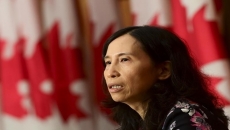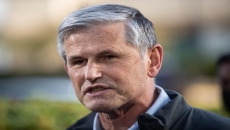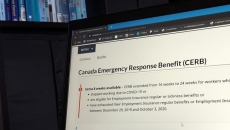Canada and Alberta have signed a deal on caribou protection that gives them years to take action but could allow energy drilling to resume on some ranges.
"I'm very concerned that development is in the fast lane, caribou conservation is slow," Carolyn Campbell of the Alberta Wilderness Association said Friday.
The deal gives the two governments up to five years to design and bring in range plans for some of Alberta's most endangered herds, which rely heavily on remaining patches of undisturbed old-growth boreal forest. That same timeline applies to restoring habitat and to avoiding new disturbances.
The plan envisions self-sustaining herds on healthy habitat some time between 50 and 100 years from now.
Campbell and Shaun Fluker, a University of Calgary law professor who follows environmental litigation, agree the deal improves transparency on conservation moves and opens a channel for federal funding.
But it will do little to change the immediate facts on the ground for caribou, said Fluker.
"There's nothing new in the details of restoration and protection. It's the same techniques they're currently doing."
Caribou conservation has been controversial in Alberta and almost every other province for years, because habitat conservation is seen to conflict with forestry, and oil and gas.
The ranges of five of Alberta's most threatened herds are between 70 and 80 per cent disturbed. Federal guidelines for healthy caribou habitat suggest the maximum is 35 per cent.
Despite the deal's promises to protect and restore habitat, it also contains loopholes that allow Alberta to developmore of it.
"The agreement lacks interim habitat protection while range plan development is proposed to occur … making it likely that critical habitat disturbance and caribou extirpation risk will continue to increase in the short-term," said Campbell.
Oil and gas drilling as well as mineral exploration may now resume on caribou ranges if it's "in alignment with woodland caribou conservation and recovery objectives," the plan says.
Alberta had stopped selling leases on those lands, Campbell noted.
She also pointed out the agreement, unlike an earlier draft, doesn't rule out more timber harvesting on caribou range in the short term.
"There's definitely been concerning backsliding in forestry," she said.
The deal was welcomed in a government news release from Alberta's energy and forestry industries.
"It provides a framework to advance caribou conservation solutions in the context of Alberta’s complex cumulative effects landscape," said Elston Dzus of Alberta-Pacific Forest Industries.
Tim McMillan of the Canadian Association of Petroleum Producerssuggested the agreement is good for everyone.
"Indigenous communities, local governments and industry can continue to forge a path forward that will help save Alberta’s caribou populations and ensure a strong economic future for all Canadians with sustainable oil and natural gas development.”
Alberta Environment Minister Jason Nixon said in a statement that the deal prevents unilateral federal action.
"This agreement avoids the disasterous (sic) effects that would be brought on by an Environmental Protection Order and underlines the importance of maintaining the province’s lead role in the development of a made-in-Alberta solution that supports caribou recovery."
Federal legislation obliges Ottawa to step in to protect herds ifprovincial efforts are insufficient. Ottawa currently faces a lawsuit over its alleged failure to do so.
Friday's announcement gives Environment Canada some legal cover, said Fluker. "It's probably effective policy in response to that litigation."
Federal Environment Jonathan Wilkinson did not immediately respond to a request for comment.
Ottawa has signed similar deals with British Columbia and the Northwest Territories.
Caribou conservation is an issue for governments across the country. A 2018 Environment Canada report found little progress anywhere while 81 per cent of Canadian herds are in decline.
Alberta's previous NDP government scaled back its own conservation plans over economic concerns.




.jpg)

